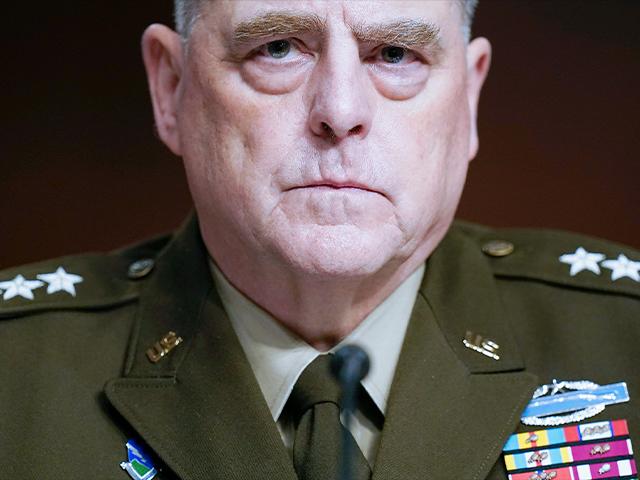
The nation’s top military leaders testified before Congress on Tuesday where they contradicted the commander-in-chief, telling lawmakers that they urged President Biden not to withdraw all U.S. forces from Afghanistan.
Chairman of the Joint Chiefs of Staff Gen. Mark Milley explained he had recommended maintaining U.S. troop presence ahead of the withdrawal. He offered quite a contradictory account compared with what the president has said. In an interview with ABC News last month, Biden said he was never given that advice as far as he could recall.
“My assessment was, back in the fall of ’20, and it remained consistent throughout, that we should keep a steady state of 25-hundred and it could bounce up to 35-hundred, maybe something like that in order to move toward a negotiated solution,” Milley told lawmakers.
Sen. Tom Cotton (R-AR) asked him, “Did you ever present that assessment personally to President Biden?”
Milley replied, “I don’t discuss exactly what my conversations are with the sitting president in the Oval Office, but I can tell you what my personal opinion was and I’m always candid.”
Gen. Frank McKenzie, commander of U.S. Central Command, testified that he also had warned what would happen if the U.S. didn’t leave 2,500 troops behind.
“My view is that 2,500 was an appropriate number to remain and that if we went below that number, we would probably witness a collapse of the Afghan government and — and the Afghan military.”
When asked if it would be “fair for the committee to assume that both President Trump and President Biden received that specific information,” McKenzie replied, “I believe it would be reasonable for the committee to assume that.”
Last month, President Biden couldn’t remember that information during an interview with ABC News when George Stephanopoulos asked him, “Your military advisors did not tell you, ‘No, we should just keep 2,500 troops. It’s been a stable situation for the last several years. We can do that. We can continue to do that’?”
Biden answered, “No. No one said that to me that I can recall.”
White House Press Secretary Jen Psaki pushed back against suggestions that the president misled the public on recommendations from his military advisers.
“The president made clear that the advice was split. He didn’t outline what every individual conveyed to him in private advice,” she said.
But Michael O’Hanlon of the Brookings Institute weighed in on the issue on CBN’s Faith Nation saying, “The central reality is we did not have to lose Afghanistan in the first place, we did not have to decide to leave in April, and Mr. Biden’s advisors did not recommend we depart when he made that decision back in the spring.”
Milley Responds to Firestorm Over His Contact with China
Afghanistan wasn’t the only topic of contention in the Capitol Hill hearing.
Some lawmakers expressed outrage after journalist Bob Woodward’s new book made it sound like Milley had subverted President Trump.
General Milley defended his decision to reach out to his Chinese counterpart, assuring China that the U.S. would not attack in the days after the January 6th Capitol riot.
“I know, I am certain, that President Trump did not intend to attack the Chinese and it was my directed responsibility by the Secretary to convey that intent to the Chinese,” he testified. “My task at that time was to de-escalate. My message again was consistent: stay calm, steady, and de-escalate. We are not going to attack you.”
He also said he reassured House Speaker Nancy Pelosi that the president could not launch an attack on his own and went over protocols with his staff
“At no time was I attempting to change or influence the process, usurp authority or insert myself in the chain of command,” Milley said.
The remainder of this article is available in its entirety at CBN